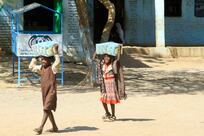In Raymond Carver's short story A Small Good Thing, a lonely baker comforts an anguished husband and wife who have just lost their son and only child with warm cinnamon rolls and hot coffee. "You have to eat and keep going. Eating is a small, good thing in a time like this," he tells them.
Last Friday, my dear friend lost her son and only child. Ronan was not yet 3 years old. Helpless and heavy-hearted, friends dispatched brownies and casseroles to the grieving family.
Over the next few days, I watched my own compulsive tendencies reach a fever pitch while I tried to regain a sense of order and control in the world. Micromanagement can be an excruciating coping mechanism but, for control freaks like me, it’s also involuntary. Comfort food can console under difficult circumstances, but when you’re slipping down the razor’s edge, reality is vinegar.
On Monday, I got back to the tedium of the day’s demands. But during a routine drive to Albuquerque, my panoramic view of the horizon dimmed and it wasn’t my sunglasses. “Maybe a pandan waffle will make me feel less awful,” I thought, and I steered the car towards Banh Mi Coda, a small cafe in Albuquerque that specialises in homemade pastries and banh mi, or Vietnamese baguettes.
Ubiquitous reminders of French colonialism in Indochina, banh mi are usually made with rice flour, which is more widely available in Vietnam than wheat, lending the small loaves a crisper crust and an ethereal crumb that melts in your mouth while you eat. This also makes it possible, if not necessary, to consume banh mi in huge quantities.
When I eat banh mi, it’s almost always been in a sandwich. Coriander, chilli peppers, sliced cucumbers and pickled carrots are typically added to the mayonnaise-smeared baguettes along with the filling of your choice. These days, my favoured protein is shrimp pancake, a dense square of fabricated fish product with the texture of bean curd. (It helps not to think too much about it.)
But the real reason to go to Banh Mi Coda is its pandan waffle. Pandan is a fragrant tropical green plant whose slender leaves bring a distinctive vanilla-coconut-pistachio flavour to South-East Asian desserts.
Banhi Mi Coda’s pandan waffle isn’t listed on the menu, but between Yelp and word of mouth, it’s become the cafe’s most popular offering. I don’t particularly understand the incentive to keep “secret” items off a menu well after they’ve acquired legendary status, but I’m happy to play along and pretend I’m special for ordering it. At Banh Mi Coda, the lurid green pandan waffle batter sits in plain sight by a Belgian waffle maker near the till.
Two women run the show at Banh Mi Coda and it’s the elder of the pair who’s responsible for the food. She hunched over the sandwiches as she assembled them, pausing periodically to poke at my pandan waffle with a wooden spatula as it puffed its way to life. When she called out my order number, I ran toward the counter so fast I almost tripped.
But this waffle was the saddest waffle I’d ever seen: a pathetic parody of its former self; a withered, greasy flap of wet, green batter, like the lifeless villain in a nightmare about Dr Seuss.
When it comes to the restaurants I like, inconsistency has always been my biggest gripe. Still, you can be resigned to heart-break without necessarily being committed to it. I didn’t have the heart to return the waffle, but I also didn’t have the heart to eat it.
Nouf Al-Qasimi is an Emirati food analyst who cooks and writes in New Mexico





